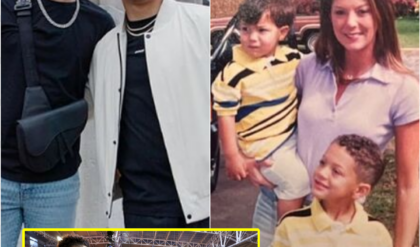ABSOLUTELY DISGUSTING: Female Inmates Who Forgot There Were Cameras In Prison | HO
FULL VIDEO BELOW:
This documentary about women in prison handed the cameras to the inmates themselves
The first time Bianca Mercer was released from the Central Nova Scotia Correctional Facility, at 23 years old, she didn’t feel elated. She felt lost.
“It was devastating,” she told The Current’s interim host Laura Lynch. “I got released with literally a note saying I got released, and two bus tickets … and I didn’t know where I was going.”
Within days, she was back to selling and using drugs. She soon found herself back at the correctional facility better known as the Burnside jail — and this time, she was pregnant.
“I had plans, but plans don’t really work, especially when you have no money or support on the outside,” she said.
Mercer is one of four incarcerated women featured in the documentary Conviction, airing on CBC’s Documentary channel on Sunday.

A still from Conviction. (NFB)
The filmmakers call Conviction a “collaborative documentary,” in which they gave cameras to the four inmates, and asked them to imagine what they would have needed in their lives to avoid ending up behind bars.
“They took that challenge immediately and started creating their own world,” said Nance Ackerman, one of the three co-directors of the film. “They created films, they created artwork, beautiful spoken word and haikus.”
Ackerman said the alarming uptick in incarcerated women was one of the key reasons they decided to make the documentary.
“They’re the largest growing prison population worldwide,” she said.

Nance Ackerman is one of the 3 co-directors of Conviction, along with Teresa MacInnes and Ariella Pahlke. The documentary is a co-production with the National Film Board. (NFB)
In Canada, the number of federally-sentenced women inmates increased almost 30 per cent between 2007 and 2017. The number of Indigenous women inmates shot up by 60 per cent in that same period.
Ackerman said that from the moment the team started talking about making the documentary, they knew they wanted to make it in collaboration with the women they filmed.
“We felt that, who were we to speak for these women?”
For Mercer, picking up the camera and telling her own story was awkward at first. But once she started getting more involved in the film, she realized that “this story has to be told,” she said.
“It’s not even just my story. … It’s thousands of women across Canada’s story, too.”
‘Once you’re in the system, you’re in the system’
As a minor, Mercer spent time in foster care, racked up charges for petty theft — initially “kids’ stuff, stealing chocolate bars,” she said — and struggled with drug addiction. It was a drugstore robbery, coupled with an array of outstanding youth charges, that finally landed her at Burnside. She was 23 years old at the time.
“And once you’re in the system, you’re in the system,” she said.
She was released in June 2016, but an arrest the following November landed her back at Burnside.
When she was released the second time, in 2017, she was seven months pregnant.
After 38 weeks, her baby was stillborn. She believes the time she spent pregnant in jail may have played a role in the loss of her child.
“There was just really a lack of health support regarding pregnancy while I was incarcerated,” she said.
According to The Deep magazine, “she was only ever given one explanation by doctors: that her baby was under duress.”

Mercer through the visitors’ glass, photographed by Ackerman. Ackerman explained to The Current that this was part of a shoot that Mercer directed while she was pregnant inside. (Nance Ackerman)
Tanya Bignell, a former correctional officer at Burnside who also took part in the film, said she has seen stories like Mercer’s many times.
“Most of the females have sustained a lot of abuse — childhood abuse, neglect, s3xual abuse, intimate partner violence,” she said. “So they basically learned how to get by on their own the best way that they could, and a lot of that had to do with illegal things and things that they learned from off the streets.”
“The women have so much potential, but they need somebody to help them show their potential,” Bignell said
Making change for incarcerated women
Mercer’s participation in Conviction motivated her to become a prison reform advocate, speaking publicly about the conditions she experienced in prison as a young pregnant woman.
“When I realized that these [filmmakers] are coming in here and actually wanting us to speak our story … and get down to the issues in society, that’s when it kind of sparked a real interest [in me],” she said.
“It ultimately changed my life and got me to where I am right now,” she said.

Brainstorming for For The Ground Up. Mercer is second from the top left. Bignell is second from the top right. (Submitted by Nance Ackerman)
Mercer and Bignell are collaborating with other female former-inmates like them, and local architect, on an emerging non-profit project they call From The Ground Up.
The hope the program will start by helping women in prison address their own past traumas and addictions, and then help to provide housing, employment support and mentorship long after they leave the prison system.
They also hope to develop it as a potential alternative to the incarceration system.

Conviction: Trailer
5 years ago
Duration1:32
The fastest growing demographic, jailed within the prison system, are women. A vast majority of these women are racialized, and there’s little being done to help those who have served their time.
Mercer just gave birth to a healthy baby girl, and she said she’s looking into pursuing a degree in law or social work. “But right now I’m just working on myself and having my little family and keeping them healthy and happy,” she said.
Mercer said that had she had access to a program like From the Ground Up, led by formerly-incarcerated women, it would have made a huge difference in her own life.
“It’s so poetic to think that criminalized women are helping criminalized women grow,” she said. “And I don’t think anyone could have helped me more than people that understand what I went through.”
News
“Fucking nightmare, Iron Mike chased me round a car 20 times, thought he was gonna kill me”: Fat Joe talks about a crazy story about Mike Tyson!😮💨 | HO
“Fucking nightmare, Iron Mike chased me round a car 20 times, thought he was gonna kill me”: Fat Joe talks about a crazy story about Mike Tyson!😮💨 | HO ‘We about to get knocked out’ Rapper Fat Joe shares a…
HO – ‘WHAT?’: Olivia Dunne shares Taylor Swift Travis Kelce TikTok after starring alongside the Chiefs Super Bowl winner in energy drink commercial
HO – ‘WHAT?’: Olivia Dunne shares Taylor Swift Travis Kelce TikTok after starring alongside the Chiefs Super Bowl winner in energy drink commercial Olivia Dunne has shared a hilarious behind-the-scenes TikTok featuring Travis Kelce and referencing his girlfriend Taylor Swift after the pair starred in a new…
HO – Travis Kelce to compete with Chiefs teammate Patrick Mahomes as the duo earn Nickelodeon Kids Choice Awards nominations… while tight end’s girlfriend Taylor Swift also gets a nod
HO – Travis Kelce to compete with Chiefs teammate Patrick Mahomes as the duo earn Nickelodeon Kids Choice Awards nominations… while tight end’s girlfriend Taylor Swift also gets a nod Travis Kelce will compete against his running mate Patrick Mahomes for a Nickelodeon…
HO – WNBA game between the Chicago Sky and Indiana Fever that featured the controversial foul on Caitlin Clark averaged over a MILLION and a half viewers – an over 300% increase from 2023
HO – WNBA game between the Chicago Sky and Indiana Fever that featured the controversial foul on Caitlin Clark averaged over a MILLION and a half viewers – an over 300% increase from 2023 The WNBA‘s Chicago Sky-Indiana Fever game that featured…
HO – “All Good”: Caitlin Clark Had The COOLEST Reaction To Being Called A “White B****” By Pat McAfee
HO – Caitlin Clark Had The COOLEST Reaction To Being Called A “White B****” By Pat McAfee Caitlin Clark has offered a reaction to being called a “White B-” by Pat McAfee, according to Pat Mcafee himself. The ESPN show host crossed a line…
HO – NFL Fans Are Worried About Tua Tagovailoa After Shocking New Photo Emerges Of The Dolphins Quarterback
HO – NFL Fans Are Worried About Tua Tagovailoa After Shocking New Photo Emerges Of The Dolphins Quarterback Tua Tagovailoa has been the subject of many conversations this off-season after the Miami Dolphins were knocked out of the NFL playoffs in the…
End of content
No more pages to load











